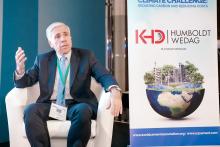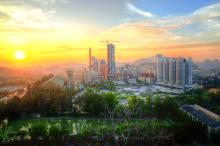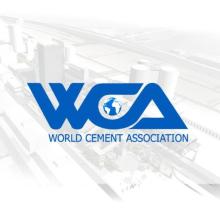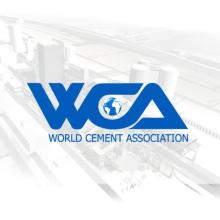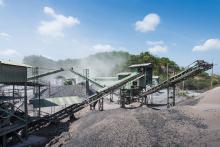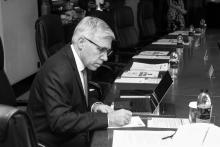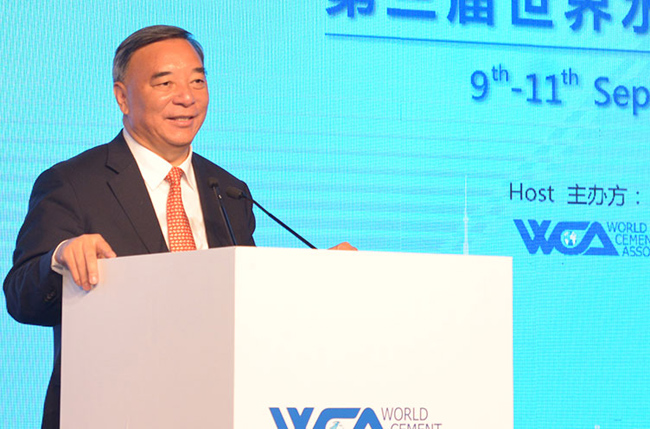
The World Cement Association has urged the industry to more swiftly adopt new technologies and put greater focus on innovation to make progress on reducing CO2 emissions.
Speaking at the association's third annual conference in Shanghai this month, WCA president and CNBM chairman Song Zhiping emphasised the importance of an industry-wide response to climate change.
“WCA supports a sustainable cement industry and encourages technical development and other steps to achieve full decarbonisation” said Song. “The development direction of the cement industry must be to spare no effort to reduce carbon intensity in production, fuel use and ultimate product use to realise sustainable development.”
Song underlined the role of WCA as the voice of the worldwide cement industry and praised WCA’s unique founding principle of equal representation.
“All WCA corporate members have the same rights, whether large or small, whether from emerging economies or developed countries,” he said. “We aim to provide a platform where even the smallest producers have a voice and to offer practical services to help members improve their business through knowledge exchange and sharing of best practices.”
The morning session at the conference had a focus on the industry and the role of the WCA.
The conference was opened by WCA CEO Ian Riley, who spoke of the 3 major trends in the industry, namely: Sustainability, innovation and internationalisation and related the WCA Mission to these trends. He explained that today, the cement industry knows how to reduce GHG emissions by 25% but there are no technically and economically feasible roadmap for the other 75%. The WCA encourages its members and the wider industry to invest in the technical and other innovations that can bring about full decarbonisation.
Riley said that the nature of internationalisation was changing. “Companies from emerging economies are seizing the initiative to shape the future of the industry as the old majors withdraw or become marginalised in the most dynamic markets by lack of investment,” he explained. “The main focus of WCA is to help companies in these emerging markets through sharing best practice, expert seminars and discussion forums and facilitating early access to new technologies.”
Arnaud Pinatel of On Field Research reviewed the global cement industry from a macro perspective. He also noted the trend amongst the majors of vertical integration into concrete and other downstream businesses, something that is also occurring in Asia.
CUCC chairman, Cui Xingtai looked at the historical development of the industry in China, reviewing the changes in technology that had driven the industry to its current huge scale, representing 55% of global production. He noted the success of the government policy of controlling pollution through enforced kiln shutdowns when air pollution is high. He noted that, “even though capacity utilisation is less than 50% in Northern China, the supply side reform policy had stabilised pricing and the industry had maintained healthy margins.”
Former Dangote CEO, Tony Hadley spoke on the theme of ‘African cement: Past, Present and Future’. Hadley commented on the turbulent situation on the continent and related this to the lack of leadership by the majors and the emergence of new competitors. Although he noted, “as far as North Africa goes, that boat has sailed,” he was upbeat about opportunities in some areas of sub Saharan Africa for patient and competent industry investors.
WCA president Song then presented the World Cement Association “Green Action Award” to Anhui Conch for their carbon capture and usage project in Wuhu, Anhui. This is an industrial pilot scale project that captures, purifies and sells 50,000 tpa of CO2. Delegates visited the project on the day following the conference and Rajnish Kapur of JK Cement said: “It’s a learning experience to see first-hand probably the first CCS project of the cement industry”
The afternoon conference session started with 3 expert presentations on alternative fuels and co-processing of waste in cement kilns. Former Lafarge VP responsible for AFR, Peter Hoddinott, spoke on strategies and key success factors and shared the lessons from his global experience of sourcing and processing wastes.
Huaxin CEO Li Yeqing spoke on the treatment of hazardous and industrial wastes and the showed how China was developing co-processing in cement kilns as a major disposal strategy for municipal solid waste. He reported that China still has a long way to go in the use of alternative fuels, “the industry majors have increased their use of AF to 22-28% of their total. In China, Huaxin leads with only a 3.2% replacement rate”.
Francisco Toscano García, former country manager for Holcim’s Geocycle, talked about maximising profitability while supporting the community through AFR’s. He drew on his experience in Mexico and Spain to draw out the lessons of how to develop a successful business. He emphasised the need for teamwork between the AFR team and the cement plant and the importance of KPIs for both groups that encouraged working to a common goal.
Zhang Zhipeng, general plant manager for Asia Cement, talked about their project to rehabilitate the company’s Hualian quarry and recover vegetation on the steep slopes. He related a story of the extraordinary challenges of the steep mountain environment and how the Asia cement team had set about the project over a period of many years. He showed photographs of the impressive results, including an ecological park and butterfly breeding zone, which really serve as an example to the whole industry worldwide.
Anhui Conch deputy general manager Li Qunfeng, spoke about their energy conservation and emission reduction practices. He highlighted the significant breakthroughs in reducing dust, SO2 and NOx. Conch has been successful in deploying AI (Intelligent production, maintenance and management platform) and expects to roll this out to all plants in the near. The hardware and robotics for these systems were purchased but the software was developed in-house by Conch engineers.
James Wong and Robert Feldmann of McKinsey showed the improvements in energy consumption, quality variability and emissions possible with comprehensive use of AI. Feldman emphasised that while some software tools could be purchased, “companies must retain control of their own data as this will be the heart of how they run the business”. Currently, most companies are in “pilot purgatory”. Feldman emphasised that AI is a skill that companies must build. He concluded that machine AI is proven to delivery results but fast scaling is the core challenge.
Di Dongren, chief engineer of Sinoma International, wrapped up the conference with a wide-reaching presentation on new technologies. He also talked about the use of AI and the impact that this can have. The improved quality control possible with an AI system makes the possibility of producing special application specific cement more practical and this may be a source of value in future. Di also reported on the latest developments in emissions control, thermal technology and cement milling.

